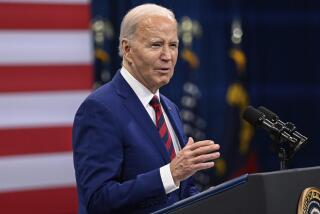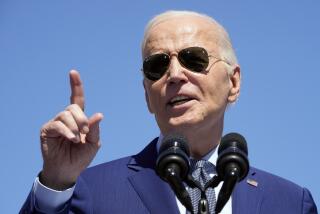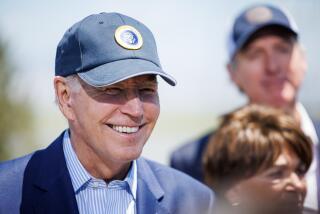Clinton Reticent in Role as President-Elect : Transition: Long on opinions as a candidate, he is suddenly demure on the economy, foreign policy and vacation plans.
It must be an awkward thing, being President-elect.
For 13 months as a candidate, Bill Clinton’s job was to answer any question anywhere at any time. Victory, sweet as it may be, has made that task more delicate.
Now the man renowned for having an opinion on every subject seems sometimes compelled to act as if he has none at all.
Wasn’t he just a bit concerned, a reporter wanted to know, by reports that President Bush might issue a lame-duck pardon for those involved in the Iran-Contra scandal? Standing outside his governor’s mansion the other day, the President-elect demurred.
“I’m not going to have any official comment for a while,” he said.
Well, couldn’t he at least offer his views on a prospective trade war, U.S.-Russian relations, foreign policy in general? “I just don’t think I should for a while,” Clinton shrugged. “I just don’t think I should say much right now.”
For the President-elect, the White House still lies 73 days away, long enough that he may yet begin to hunger more publicly after the office he has dreamed of for nearly 30 years. So far, however, he has suppressed that appetite so steadfastly that his first six days as President-elect have taken on an oddly tentative cast.
By his own cautious account, he cannot even lay claim to the title until the Electoral College acts to make the people’s choice final. He warned again Monday that the economic outlook remains tainted by “very troubling signs,” but declined to talk about how that situation might be improved.
“I have made all the news I can today,” he grinned at a photo session outside his mansion as Vice President-elect Al Gore arrived there to resume planning for their transition to power. “I’ve made lots of news,” he repeated gleefully, after doing almost nothing of the kind.
In between phone calls from reporters desperate for more information, Press Secretary Dee Dee Myers defended her boss’ stance as “cautious by necessity.”
“The markers all change when you become President-elect,” she insisted, while choosing not to heed Clinton’s advice on honorific titles.
Indeed, after Clinton found himself drawn last week into more substantive conversations than intended with such foreign leaders as Russian President Boris N. Yeltsin, his aides were careful to stress Monday the circumspect tone he was taking in conversations with foreign leaders.
A rendering by his spokesman of the calls Clinton placed Monday morning to the leaders of Germany, Israel and South Africa conveyed the bland tone that made clear they were the diplomatic equivalent of a Hallmark greeting card.
The President-elect was said to have assured Israeli Prime Minister Yitzhak Rabin of his own support for the Middle East peace process. Communications Director George Stephanopoulos stressed, however, that the Clinton camp had no immediate plans to dispatch an emissary to observe those talks.
Behind closed doors, first within the state Capitol and then his governor’s mansion, Clinton was said by aides to have resumed the intensive private consultations intended to give form to the skeletal outlines he offered from the campaign trail of his plans for the new Democratic Administration.
In what may become the inner circle of his Little Rock-based transition operation, Clinton met throughout the afternoon with Gore, Stephanopoulos, team director Warren Christopher, and attorney Bruce Lindsey, his longtime friend and campaign aide.
But he took a break at the Capitol to meet with his mother, Virginia Kelly, who wore a white satin jogging suit, a Clinton-Gore jacket and red suede cowboy boots and said that the two had “some family stuff to talk about.”
And for the sixth straight day since his victory, he chose to put off the news conference that has become the standard forum for an incoming President to revel in his post-election stature.
Clinton instead employed a passive tone in his few public utterances, at one point describing a planned economic summit here next month as an opportunity for him to meet with “some of the brightest people in the country” and to collect “as many good ideas as I can.”
Having allowed aides to unveil the idea over the weekend, Clinton said that the still-unscheduled two- to three-day meeting would “give some people a chance to have their say to me directly and talk about what our options are.” He was even more circumspect when it came to his personal plans.
After saying over the weekend that he had not yet determined when or where he would vacation, he said Monday morning that he had “worked out a schedule” to turn the governorship over to Lt. Gov. Jim Guy Tucker. But he quickly added that the two had not set a date for the transfer.
Clinton aides said that his sudden all-but-silence is attributable in part to the return of the hoarseness that has kept him from saying much even to his family and friends. But they also said that he apparently gave thought even before the election to the constraints that his new status would carry.
“When you’re a candidate, you’re allowed to sort of ruminate on issues of public concern,” said Myers, who spent the campaign with a tape recorder ready to ensure that such ruminations did not go unchronicled.
At a midday briefing Monday, Stephanopoulos offered reporters his assurance that the President-elect plans a news conference “real soon.” But he added that the governor would “take it issue by issue,” in deciding whether it makes sense to remain mum.
In a stuffy ground-floor room in the former campaign headquarters, Stephanopoulos spent much of a 20-minute daily briefing steering his way past questions about Clinton’s views on subjects such as the new flurry of neo-Nazi demonstrations in Germany.
More to Read
Get the L.A. Times Politics newsletter
Deeply reported insights into legislation, politics and policy from Sacramento, Washington and beyond. In your inbox three times per week.
You may occasionally receive promotional content from the Los Angeles Times.






